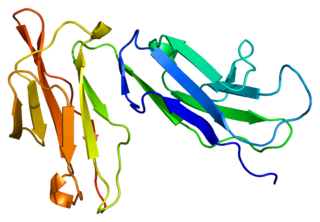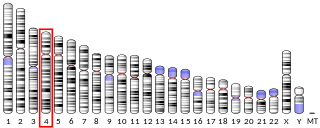Related Research Articles

ADAMs are a family of single-pass transmembrane and secreted metalloendopeptidases. All ADAMs are characterized by a particular domain organization featuring a pro-domain, a metalloprotease, a disintegrin, a cysteine-rich, an epidermal-growth factor like and a transmembrane domain, as well as a C-terminal cytoplasmic tail. Nonetheless, not all human ADAMs have a functional protease domain, which indicates that their biological function mainly depends on protein–protein interactions. Those ADAMs which are active proteases are classified as sheddases because they cut off or shed extracellular portions of transmembrane proteins. For example, ADAM10 can cut off part of the HER2 receptor, thereby activating it. ADAM genes are found in animals, choanoflagellates, fungi and some groups of green algae. Most green algae and all land plants likely lost ADAM proteins.

A disintegrin and metalloprotease 17 (ADAM17), also called TACE, is a 70-kDa enzyme that belongs to the ADAM protein family of disintegrins and metalloproteases, activated by substrate presentation.

Chemokine receptor 6 also known as CCR6 is a CC chemokine receptor protein which in humans is encoded by the CCR6 gene. CCR6 has also recently been designated CD196. The gene is located on the long arm of Chromosome 6 (6q27) on the Watson (plus) strand. It is 139,737 bases long and encodes a protein of 374 amino acids.

Disintegrin and metalloproteinase domain-containing protein 12 is an enzyme that in humans is encoded by the ADAM12 gene. ADAM12 has two splice variants: ADAM12-L, the long form, has a transmembrane region and ADAM12-S, a shorter variant, is soluble and lacks the transmembrane and cytoplasmic domains.

Disintegrin and metalloproteinase domain-containing protein 15 is an enzyme that in humans is encoded by the ADAM15 gene.

CD69 is a human transmembrane C-Type lectin protein encoded by the CD69 gene. It is an early activation marker that is expressed in hematopoietic stem cells, T cells, and many other cell types in the immune system. It is also implicated in T cell differentiation as well as lymphocyte retention in lymphoid organs.

G-protein coupled receptor 183 also known as Epstein-Barr virus-induced G-protein coupled receptor 2 (EBI2) is a protein (GPCR) expressed on the surface of some immune cells, namely B cells and T cells; in humans it is encoded by the GPR183 gene. Expression of EBI2 is one critical mediator of immune cell localization within lymph nodes, responsible in part for the coordination of B cell, T cell, and dendritic cell movement and interaction following antigen exposure. EBI2 is a receptor for oxysterols. The most potent activator is 7α,25-dihydroxycholesterol (7α,25-OHC), with other oxysterols exhibiting varying affinities for the receptor. Oxysterol gradients drive chemotaxis, attracting the EBI2-expressing cells to locations of high ligand concentration. The GPR183 gene was identified due to its upregulation during Epstein-Barr virus infection of the Burkitt's lymphoma cell line BL41, hence its name: EBI2.

A Disintegrin and metalloproteinase domain-containing protein 10, also known as ADAM10 or CDw156 or CD156c is a protein that in humans is encoded by the ADAM10 gene.

Disintegrin and metalloproteinase domain-containing protein 9 is an enzyme that in humans is encoded by the ADAM9 gene.

Disintegrin and metalloproteinase domain-containing protein 33 is an enzyme that in humans is encoded by the ADAM33 gene.

ADAM19 , is a human gene.

Mitotic spindle assembly checkpoint protein MAD2B is a protein that in humans is encoded by the MAD2L2 gene.

Disintegrin and metalloproteinase domain-containing protein 22, also known as ADAM22, is an enzyme that in humans is encoded by the ADAM22 gene.

Fc fragment of IgG receptor IIb is a low affinity inhibitory receptor for the Fc region of immunoglobulin gamma (IgG). FCGR2B participates in the phagocytosis of immune complexes and in the regulation of antibody production by B lymphocytes.

Disintegrin and metalloproteinase domain-containing protein 23 is a non-catalytic protein that in humans is encoded by the ADAM23 gene. It is a member of the ADAM family of extracellular matrix metalloproteinases.

A Disintegrin and metalloproteinase domain-containing protein 8 is an enzyme that in humans is encoded by the ADAM8 gene.

Disintegrin and metalloproteinase domain-containing protein 28 is an enzyme that in humans is encoded by the ADAM28 gene.

Disintegrin and metalloproteinase domain-containing protein 11 is an enzyme that in humans is encoded by the ADAM11 gene.

A disintegrin and metalloproteinase with thrombospondin motifs 3 is an enzyme that in humans is encoded by the ADAMTS3 gene. The protein encoded by this gene is the major procollagen II N-propeptidase.

Disintegrin and metalloproteinase domain-containing protein 18 is an enzyme that in humans is encoded by the ADAM18 gene.
References
- ↑ "Entrez Gene: ADAM-like, decysin 1" . Retrieved 2014-08-16.